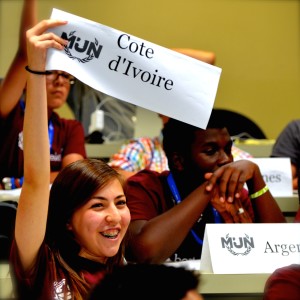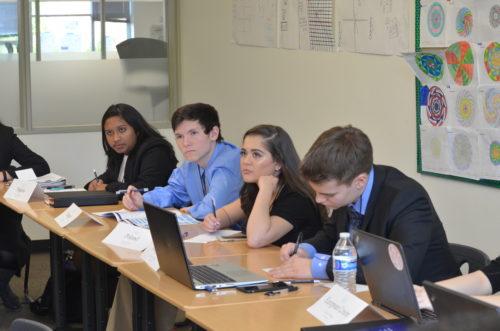Most days I will read multiple articles from reputable sources such as Foreign Affairs, Strategic Forecasting, or Geopolitical Futures. I watch lectures from IR scholars and I read books from the titans of diplomacy such as Kissinger and Brzezinski. I can’t expect everybody to be as much of an International Relations wonk as I am, but the more I learn about IR, the less satisfying MUN becomes. In my view, MUN should be a simulation of the United Nations involving well informed discussion between delegates rigorously adhering to country policy in an attempt to write realistic resolutions. My experience has given me quite a different view. This isn’t to say that good debate isn’t found in MUN, but my last four years has shown me that far too often the impossible resolutions pass, the spoiler countries lead the blocs, the chairs tell everybody to get along, and the flirts get the awards. MUN has become about International Relations in name only. It has moved away from policy debate to who has the social skills. There is less and less room for the well informed but less socially gifted, and more and more room for the schmooze delegate who has no idea what they are talking about. This problem is then exacerbated by many conferences insistence on growth and attracting as many people as possible without a second thought as to how that may degrade the experience. As much as I love MUN, this does paint a bleak picture. But it doesn’t always have to be this way. The MUN community stands at a crossroads and we have to make a decision of whether we wish to become more inclusive and have broader appeal, or if we wish to preserve the educational integrity and professional roots of MUN.
I would be remiss if I just espoused my philosophy without actual solutions. My recommendations for policies that conference should adhere to are as follows:
- Don’t let impossible or irrational resolutions reach the floor of committee. Chairs are not only the moderators of debate, they should by enforcers of reality in MUN. If chairs would take a stand and refuse to let a GA committee debate a resolution sending peacekeepers somewhere, we wouldn’t be having as many problems. Granted this is an extreme example, but the truth is that the options the UN has for dealing with problems are limited, and chairs should enforce this reality. Instead, they are pressured to pass resolutions for the sake of passing them, no matter what the content may be.
- Encourage longer speaking times. Having a minute long speaking time rewards those with little content and penalizes those with more content. In a minute, a delegate can maybe get out a point or two, but often, the speeches are about rhetoric and being seen more than they are about content. I have never been able to adequately explain a complex policy in a minute, which results in it being shot down because it is misunderstood. Having 3 or 5 minute speeches may sound extreme, but it promotes substantive policy debate among delegates.
- Re-evaluate award criteria. First, conferences actually need to uphold position paper deadlines and requirements; too many times have I seen delegates who admitted to not writing one, or submitting one late, and end up winning awards when it was clearly stated they would not. More importantly though, awards should go to those who uphold country policy the most and are best informed with the contents of the debate. Awards should not be solely based who is the most popular delegate or the best speaker, which obviously is important, but shouldn’t be the only criteria. Related to this is toothless negotiation. Too often, delegates won’t say “no” when negotiating because not working together is perceived as bad. Sometimes countries don’t work together and negotiations fail. We shouldn’t put the ideal of cooperation above the reality of rational interests.
This is of course my opinion for how Model U.N need to change. I’m interested to hear how you guys feel! Comments are welcomed!




